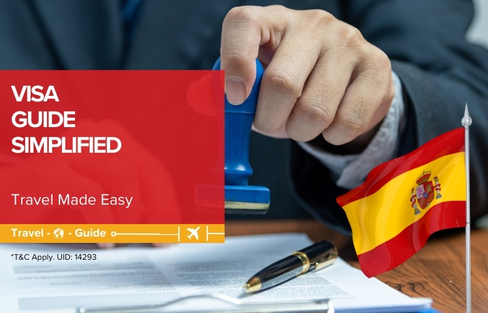

Visa in Spain
- Introduction
- Spain Visa
- Features of Spain Visa
- Types of Spain Visa
- Visa Application Process
- Visa Validity
- When to Apply
- Documents Required
- Fees
- Visa Status
- Processing Time
- Conclusion
Introduction
With the aid of a Spain visa, non-EU nationals can travel to and remain in Spain for the duration of a defined activity, such as a job, study, or visit with family. There are several sorts of visas available, including tourist, business, student, and work visas, depending on the reason for travel and length of stay.
What is a Spain Visa?
Did you know?
- Did you know that Spain is one of the most frequently requested visa destinations in the Schengen region? Spain received more Schengen visa requests than either France or Germany combined in 2019. Due to its diverse population, stunning scenery, and energetic cities, it is a popular travel destination, which raises the number of visa applications.
- Non-EU nationals can visit, work, study, or stay with family in Spain with the use of a visa. There are visas for business, tourism, education, and employment. It is essential to confirm with the Spanish consulate or embassy in advance because processing dates and criteria can differ.Did you know?
- Did you know that Spain is one of the most frequently requested visa destinations in the Schengen region? Spain received more Schengen visa requests than either France or Germany combined in 2019. Due to its diverse population, stunning scenery, and energetic cities, it is a popular travel destination, which raises the number of visa applications.
Non-EU nationals can visit, work, study, or stay with family in Spain with the use of a visa. There are visas for business, tourism, education, and employment. It is essential to confirm with the Spanish consulate or embassy in advance because processing dates and criteria can differ.
Features of Spain Visa
Travel tip: It is essential to stay within the permitted period of time to avoid overstaying, which may result in penalties, deportation, or future travel restrictions.
Visitors from outside the EU can take advantage of a number of services provided by the Spain Visa. It is designed for a variety of uses, each with unique requirements, including travel, business, study, and employment. The Spanish consulate or embassy is where you can receive the visa, which has a set stay term. Depending on the type of visa and the applicant's nationality, processing periods and requirements may change.
Types of Spain Visa
Did you know?
- Did you know that Spanish universities are a common choice for people looking to pursue higher education? International students are permitted to study and work part-time while enrolled in school, thanks to the Student Visa. This offers a special chance to learn about Spanish culture and acquire useful professional experience.
- Have you heard of Spain's unique "Golden Visa" programme? By making a certain amount of real estate investment, investors and their families can open a path to citizenship and permanent residency. High-net-worth individuals are drawn to this feature because they want to build a foundation in Europe and take advantage of Spain's advantages and way of life.
Spain Visas come in a variety of forms, each suited to certain purposes and lengths of stay. Typical types include:
- Tourist visa: For brief vacations or touristic stays.
- Business visa: A business visa is required to conduct business, such as attending conferences or meetings.
Tip: To prove the validity and necessity of your trip, you should submit precise and thorough evidence of your purpose, itinerary, and meetings when applying for a business visa for Spain.
- Student Visa: For those taking part in Spanish educational programmes.
- Work visa: A work visa is required if you want to work in Spain.
- Family Reunion Visa: Used to reunite with relatives who already reside in Spain.
Tip: Make sure you have all the required documentation to show your family's link if you need a Spain visa for a family reunion. To support your application, include official documents such as birth certificates and marriage licences.
- Transit visa: Travellers travelling through Spain on their way to another country need a transit visa.
1. Non-Immigrant Visa
Did you know?
- Did you know that those on non-immigrant visas for Spain, such as tourists or temporary workers, frequently have to show evidence of having enough money to support themselves while they are there? This makes it possible for guests to pay their bills without putting a strain on the country's social welfare system.
- A non-immigrant visa for Spain is intended for brief stays and particular activities like travel, business, study, or employment. It enables visitors from outside the EU to enter the nation temporarily without intending to settle there permanently. Non-immigrant visas are issued in accordance with the visitor's purpose of travel and can be applied for at the Spanish consulate or embassy in the applicant's home nation.
2. Immigrant Visa
Did you know?
- Did you know that, depending on the particular circumstances and requirements met during your time as a resident, receiving an immigrant visa for Spain may eventually result in permanent residency and even Spanish citizenship? This procedure may offer a route to long-term habitation and social integration in Spain.
- For anyone wishing to live permanently in Spain, an immigrant visa is required. People who have family ties to Spain, have job offers there or are looking to invest there frequently receive it. Once issued, the immigrant visa permits long-term residence in Spain and could ultimately result in citizenship.
Visa Application Process
Did you know?
- Did you know that as part of the security and identification procedures, the visa application process frequently requires the submission of biometric data, such as fingerprints and photographs? The overall integrity of the visa application process is improved by using this data to confirm the applicant's identity and stop fraud.
Keep in mind that specific criteria can vary, therefore, for clear instructions, visit official sources. These steps are part of the visa application process:
- Decide on a visa type: Depending on why you're visiting, choose the right visa category.
- Gather Documents: Compile the required paperwork, including a current passport, application form, pictures, travel insurance, financial documentation, and documents linked to the purpose of the trip.
1. Non-Immigrant Visa
- Determine your visa type by considering your intended use for the trip (tourist, business, education, employment, etc.).
- Gather all required paperwork, including a current passport, filled-out application, passport-sized pictures, travel insurance, financial documentation, and documents pertaining to your intended purpose (such as an acceptance letter for study or a job offer for employment).
2. Immigrant Visa
- Determine your eligibility through ties to your family, employment, or investment.
- Put together the required paperwork, which should include a current passport, an application form, evidence of a relationship, employment, or investment, a background check, health insurance, and financial documentation.
- Apply: Make an appointment, turn in your application, and pay the required money at the Spanish consulate or embassy.
- Attend Interview: If necessary, attend an interview.
Tip: Be succinct and sincere while answering questions during a visa interview. Give a thorough explanation of the reason for your visit, present the required paperwork, and boldly respond to inquiries. Clarify any issues you may have and keep your attention on the reason for your visit.
- Wait: Allow time for processing, which varies depending on the nationality and kind of visa.
- Decision: Find out the outcome of your application.
- Travel: If permitted, enter Spain throughout the visa's period of validity while observing the entry and stay restrictions.
Validity of A Spain Visa
Did you know?
Did you know that a Spain visa's validity starts on the day it is issued, not the day you enter the country? The commencement date and length of the visa, which are listed on the visa label, will determine how long you are permitted to stay in the nation, therefore it is crucial to arrange your vacation properly.
The type of visa you have and the reason for your trip will determine how long it will be valid. Typically, tourist visas are only valid for up to 90 days out of a 180-day term. The validity of other categories, such as work or study visas, may be prolonged to correspond with the length of the particular activity. To prevent legal problems, it's critical to respect the visa's stated maximum stay period and leave the nation before it expires.
When To Apply For Spain Visa
Did you know?
Did you know that you can obtain a Spain visa through an external visa application centre at select Spanish consulates or embassies? In order to make the application procedure more convenient for applicants, these centres offer extra services such as document gathering, biometric data collection, and tracking.
It is advised to apply for a Spain visa well in advance of the date you plan to go. Applications can often be filed up to three months before your anticipated departure. It's best to apply at least 4-6 weeks in advance to account for processing time and any possible delays. To ensure you have enough time to meet all requirements and obtain your visa before your intended departure date, it's advised to start the application process even earlier for some visa types, such as study or work visas, which may need additional documentation or approval from Spanish authorities.
Documents Required
Depending on the sort of visa you're looking for, there may be different documentation needed for a Spain visa. However, typical documents frequently contain:
- Passport in good standing with at least two blank pages.
- A properly filled out visa application.
- Photos the size of a passport that follows certain rules.
- Documentation proving that you have comprehensive travel insurance.
- A reservation or itinerary for a flight.
- Documentation demonstrating your financial capacity to pay for your stay.
- Documents connected to the purpose, such as acceptance letters, hotel reservations, work contracts, etc.
- Cover letter for the Schengen visa outlining your itinerary and trip's purpose.
- Documentation of the accommodations.
- A letter of approval from your employer or school, if appropriate.
Spain Visa Fees
Did you know?
- Did you know that Spain and a few other nations have bilateral agreements that could result in reduced or cancelled visa fees? This indicates that individuals from these nations may qualify for reduced visa costs when requesting a Spain visa. India is one of the nations that has a bilateral visa fee reduction agreement with Spain.
Visa fees for Spain vary depending on the type of visa, the applicant's age, and other considerations. You'll also have to pay a fee to the visa application centre in addition to the visa fee.
If you need a Schengen visa for a brief visit to Spain, you'll probably have to pay the following price. The following list includes the costs for Spanish Schengen visas:
- Adults: €80
- Minors under 12: €40,
- Children under 6 do not need to pay a visa charge.
Check For Visa Status
Visit the official website of the Spanish embassy or consulate where you submitted your application to find out the status of your Spain visa. You may need to provide your application reference number or passport information in the section for tracking visa applications. This will advise you of the most recent status of your visa application, including whether it is being considered, has been granted, or requires further information. Keep in mind that processing timeframes can change, so be patient and check for updates frequently.
Visa Processing Time
Did you know?
Did you know that some nations charge a premium for expedited or fast-track visa processing services? This might be very useful if you need your visa approved quickly. It's possible that not all visa categories or nationalities are qualified for accelerated processing. To find out if this choice is available and appropriate for your circumstances, it is a good idea to contact the relevant consulate or embassy. Although expedited processing can speed up the procedure, preparation is still necessary to guarantee a hassle-free trip.
Depending on the type of visa, the number of applications, and your country of citizenship, the processing time for a Spain visa can change. The processing time for a typical Schengen Visa application ranges from 15 days to several weeks. But occasionally, it could take up to 30 days or longer. The processing period can be lengthier for long-stay visas, including work or study visas, and is frequently between a few weeks and a few months. To account for any unforeseen delays and guarantee a simpler visa application procedure, it is advised to apply well in advance of your anticipated travel date.
Conclusion
In summary, acquiring a Spain visa necessitates careful planning and adherence to predetermined standards. Whether applying for a non-immigrant visa for short-term visits or an immigrant visa for long-term residence, it's critical to select the appropriate visa category, gather the required paperwork, and carefully complete the application procedure. It is crucial to keep up with changes to legislation, processing times, and fees. Consult the legitimate Spanish embassy or consulate to guarantee you have access to current, reliable information specific to your needs. Navigating the Spain Visa procedure can result in a successful and fulfilling trip or residency experience with careful planning and attention to detail.








 Health Insurance
Health Insurance  Travel Insurance
Travel Insurance  Car Insurance
Car Insurance  Cyber Insurance
Cyber Insurance  Critical Illness Insurance
Critical Illness Insurance
 Pet Insurance
Pet Insurance
 Bike/Two Wheeler Insurance
Bike/Two Wheeler Insurance  Home Insurance
Home Insurance  Third Party Vehicle Ins.
Third Party Vehicle Ins.  Tractor Insurance
Tractor Insurance  Goods Carrying Vehicle Ins.
Goods Carrying Vehicle Ins.  Passenger Carrying Vehicle Ins.
Passenger Carrying Vehicle Ins.  Compulsory Personal Accident Insurance
Compulsory Personal Accident Insurance  Travel Insurance
Travel Insurance  Rural
Rural 










